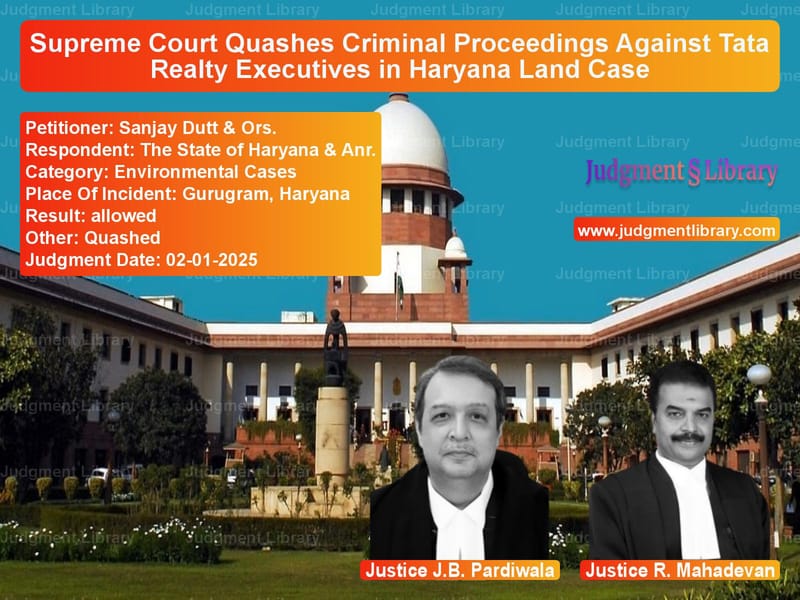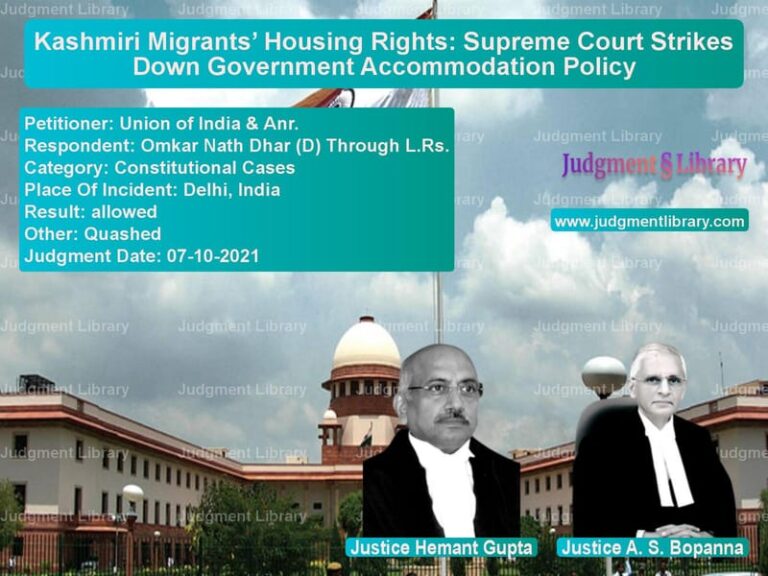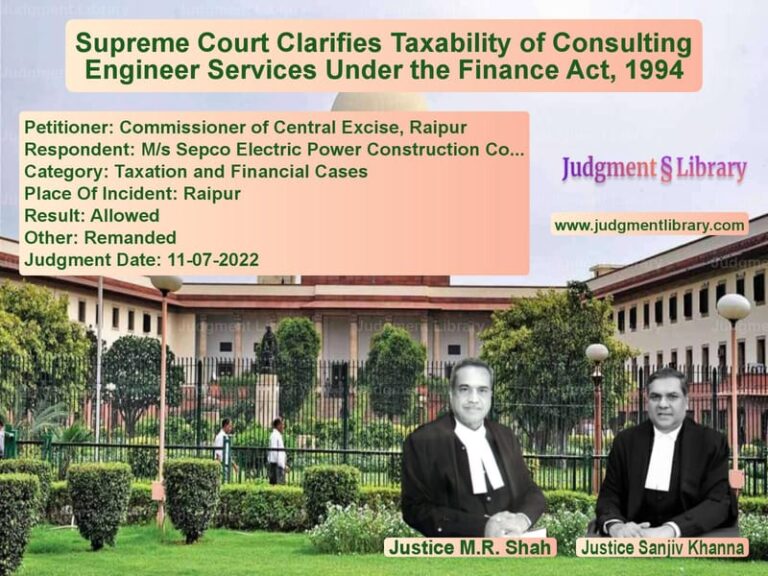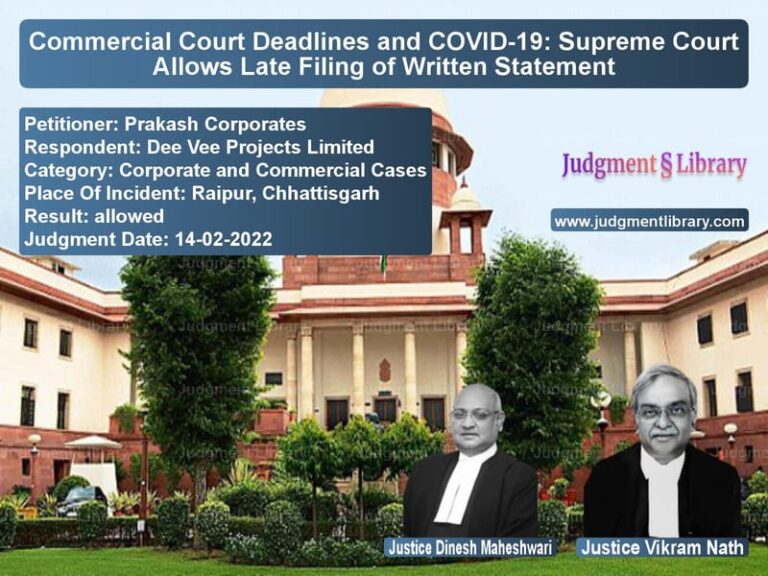Supreme Court Quashes Criminal Proceedings Against Tata Realty Executives in Haryana Land Case
The Supreme Court of India, in the case of Sanjay Dutt & Ors. vs. The State of Haryana & Anr., ruled in favor of the appellants by quashing criminal proceedings initiated under the Punjab Land Preservation Act, 1900 (PLPA). The case involved allegations that the appellants, senior executives of Tata Realty and Infrastructure Ltd., violated environmental laws by illegally uprooting trees on a notified land in Gurugram. The Court held that the prosecution failed to establish individual liability against the appellants, as the company itself was not made a party to the case.
Background of the Case
The appellants, including the Managing Director and General Manager of Tata Realty, were accused of violating Section 4 of the PLPA, 1900, which restricts clearing or breaking up of land in designated forest areas. The complaint was filed by the Range Forest Officer, Gurugram, alleging that the appellants illegally uprooted 256 trees and destroyed 62 small plants using JCB machines in Sector 113, Gurugram.
The Special Environment Court, Faridabad, took cognizance of the case and issued summons under Section 19 of the PLPA, 1900. The appellants challenged this order before the Punjab and Haryana High Court, which dismissed their plea for quashing the proceedings. Aggrieved by this decision, they approached the Supreme Court.
Key Legal Issues
- Whether the prosecution established individual liability of the appellants under PLPA, 1900?
- Whether directors and officers of a company can be prosecuted without making the company a party to the case?
- Whether the criminal proceedings should be quashed due to lack of sufficient allegations?
Petitioners’ Arguments
- The appellants were merely officers of Tata Realty and were not personally responsible for the alleged violations.
- The prosecution failed to name the company as an accused, which is a fundamental flaw in the complaint.
- There were no specific allegations proving that the appellants were directly involved in felling trees or using JCB machines.
- The complaint relied on vague assertions without substantiating the personal involvement of the appellants.
Respondents’ Arguments
- The appellants, as senior executives, were responsible for ensuring compliance with environmental laws.
- The damage to forest land was established through official reports and statements from forest officers.
- The appellants did not obtain prior permission before clearing the trees, which constituted a violation of PLPA, 1900.
- Corporate officers cannot escape liability merely because they act on behalf of a company.
Supreme Court’s Observations
1. No Vicarious Liability Without Specific Allegations
The Court ruled that mere designation as a director or executive does not automatically make an individual liable for corporate actions. The judgment emphasized:
“There must be specific allegations proving individual involvement. Simply being a director or officer of a company does not make one vicariously liable.”
2. Company Not Made a Party
The Court observed that Tata Realty, the entity that held the license for land development, was not named in the complaint. The absence of the company as an accused made the prosecution untenable.
“When the company is the offender, liability of directors does not arise unless the statute specifically provides for it or there are clear allegations against them.”
3. Lack of Direct Evidence Against the Appellants
The Court found that the complaint failed to establish any direct involvement of the appellants in the alleged act of tree felling.
“There are no allegations worth the name in the complaint that the appellants personally uprooted trees or directed such actions.”
Final Verdict
- The Supreme Court quashed the criminal proceedings against the appellants.
- The Court clarified that the authorities could still take action against Tata Realty if environmental violations were proven.
- The ruling set a precedent for corporate liability in environmental cases, emphasizing that individual executives cannot be held responsible in the absence of specific evidence.
Conclusion
This judgment reinforces the principle that corporate liability must be established before holding individual executives responsible for alleged violations. The ruling protects corporate officers from arbitrary prosecution while ensuring that environmental laws are enforced fairly.
Petitioner Name: Sanjay Dutt & Ors..Respondent Name: The State of Haryana & Anr..Judgment By: Justice J.B. Pardiwala, Justice R. Mahadevan.Place Of Incident: Gurugram, Haryana.Judgment Date: 02-01-2025.
Don’t miss out on the full details! Download the complete judgment in PDF format below and gain valuable insights instantly!
Download Judgment: sanjay-dutt-&-ors.-vs-the-state-of-haryana-supreme-court-of-india-judgment-dated-02-01-2025.pdf
Directly Download Judgment: Directly download this Judgment
See all petitions in Legal Malpractice
See all petitions in Contempt Of Court cases
See all petitions in Other Cases
See all petitions in Judgment by J.B. Pardiwala
See all petitions in Judgment by R. Mahadevan
See all petitions in allowed
See all petitions in Quashed
See all petitions in supreme court of India judgments January 2025
See all petitions in 2025 judgments
See all posts in Environmental Cases Category
See all allowed petitions in Environmental Cases Category
See all Dismissed petitions in Environmental Cases Category
See all partially allowed petitions in Environmental Cases Category







